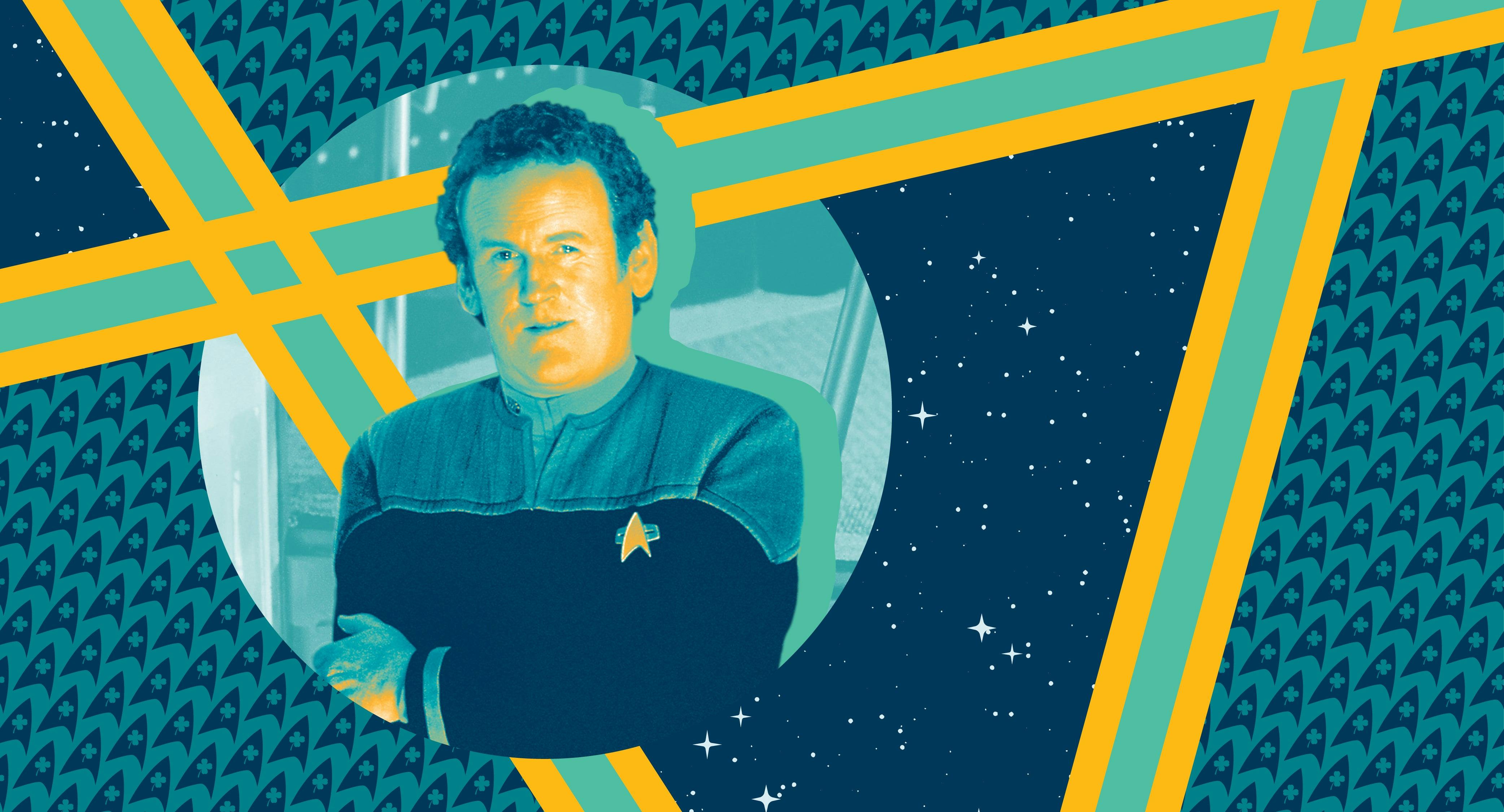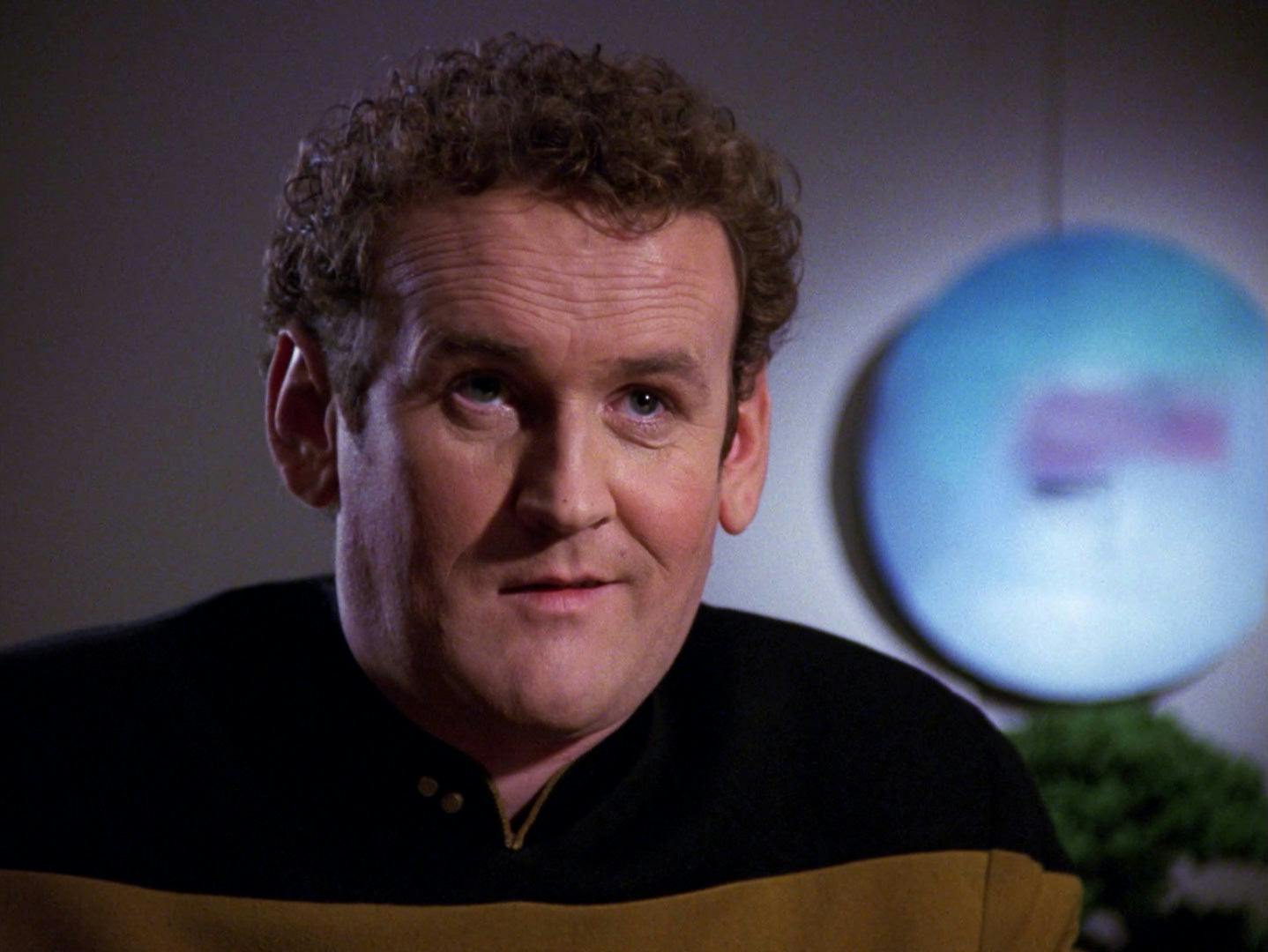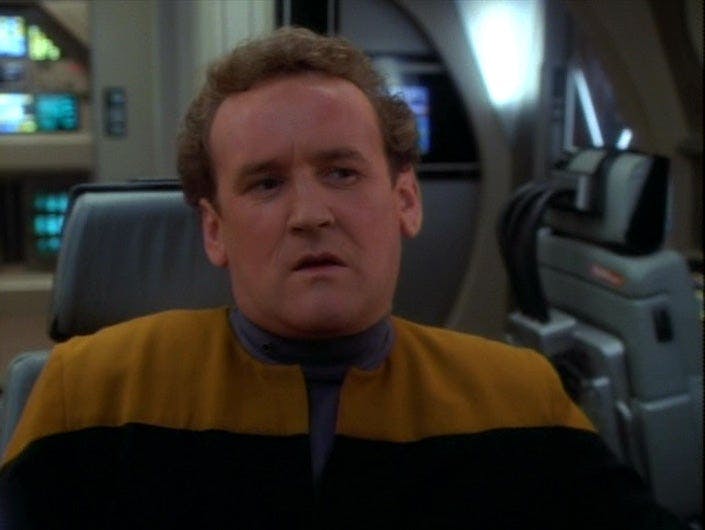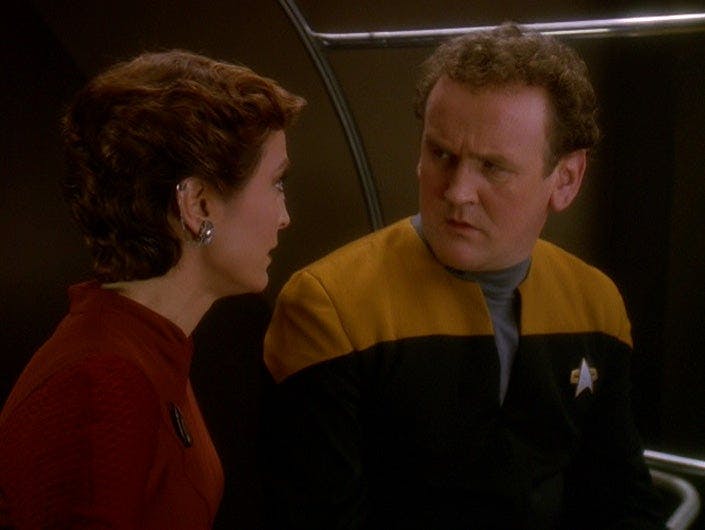Published Mar 17, 2022
Miles O'Brien Redefines What it Means to be an Irishman in Space
What Colm Meaney's 'anti-notions' mindset brought to Star Trek.

StarTrek.com
“Did you ever feel, y’know, stupid, on Star Trek?”
“Did you ever feel stupid in that hat?”
Irish actor Colm Meaney recently appeared on one of the most-discussed and watched TV shows in his home country, in which local comedian Tommy Tiernan interviews people he doesn’t have a clue about. Despite the dodgy premise, it’s second only to the ongoing Late Late Show (which itself is second only to America’s The Tonight Show as the world’s longest-running late-night talk show) in terms of engagement; within a minute of his arrival on screen, details trended on Twitter, followed by clips and appropriately devastating quotes.
Tiernan’s epic ignorance about science fiction prompted Meaney to explain the concerns of the third-season Deep Space Nine two-parter, ‘Past Tense’, in which issues of homelessness (among others) are explored in ways that have become more, rather than less, prescient as the episode ages. Fans will recall that Meaney’s character, Chief Miles Edward O’Brien, mostly beams up and down from Earth at different time periods during these episodes; it’s telling that he cited these despite his own relatively peripheral involvement.
But the thing with Colm Meaney — even though he has spent many years living away from his native land — is that he is still very, very Irish. To point to an episode he had a central role in — TNG’s ‘The Wounded’, DS9’s ‘Whispers’, ‘Tribunal’, and ‘Hard Time’ to name but a few — would be ‘notions’.

StarTrek.com
As an Irish woman, I understand that ‘notions’ is a decidedly Irish term, so let me explain: ‘Notions’ refers to anything moderately fancy that can be prefaced with ‘tis far you were reared from.’ It includes things like almond milk, bagels, and not being mired in self-loathing. While I’ve not taken a poll, I do believe that part of the reason we love Colm Meaney is because he is anti-notions. He feels like the kind of guy you could have a pint with (it’s also my understanding that Americans prefer their presidential candidates to have this quality). The kind of guy who would be mortified by the idea of a petition to erect a statue in his honor. And even though his long career has included a range of roles, including a number of Irish ‘baddies’ and terrorists, Meaney still seems like he’s basically a mix of his two most iconic roles, Chief O’Brien and the ‘da’ in the movies The Commitments, The Snapper, and The Van (based on Roddy Doyle’s Barrytown trilogy). There’s even a delightful social media account, Roddy Doyle’s Star Trek, which pairs up screenshots of Miles O’Brien with modern Dublin slang and commentary on current events.
It works because O’Brien is the closest thing to a modern-day character you’ll find in the second-generation (i.e. TNG, DS9, VOY, ENT) Trek series. He moves from being the background character to transporter chief to war veteran on TNG, and the sense of him as the ‘everyman’ carried over to his role as one of the main cast on DS9. He’s an enlisted crewman rather than an officer; he’s been decorated several times by Starfleet but it’s not a big deal, he just does what he’s told. His capacity for fixing things makes him just as much of a genius as his genetically-enhanced friend, Dr Bashir, but he thinks of himself as a guy doing his job and his duty, nothing more.

StarTrek.com
Of course these sorts of characters appear in all kinds of media, but it’s particularly meaningful for an Irish audience to have someone like O’Brien being on a space station and doing his job, while still being Irish. We are a nation that feels like a safe target for global — but particularly North American and British — audiences to poke fun at. After all, we’re largely white, and we’ve sent our citizens around the world to give so many people Irish heritage. There was also a point up until relatively recently where the ‘Irish terrorist’ trope felt valid rather than a cliché - until the peace process in Northern Ireland in the 1990s, there was terrorist activity in the country and beyond (and as we know from TNG’s "The Higher Ground," it’ll lead to reunification of the country in 2024!).
Irish tropes turn up everywhere, even when you least expect them, and so the ‘representation’ we recieve is only grand (in the Irish sense of meaning ‘okay’, not the British sense of ‘posh’), until you get a bit sick of it..You don’t, for example, expect to find a stereotypical, cringe-worthy portrayal of an Irish community when settling down to watch season 2 of TNG, and yet that’s exactly what “Up The Long Ladder” provided. Similarly, you don’t expect that the crew of Voyager, with the capacity to base a holodeck program anywhere in the galaxy, will settle on a twee 19th-century Irish village (“Fair Haven”). While the rest of the world gets to go into space, Ireland is stuck in a mythicized, romanticized past. It’s bad enough to get the cartoonish portrayals — and terrible accents — in other media, but as Colm Meaney notes in The Official Deep Space Nine Companion, "Using caricatures or cliches of any nation is not something Star Trek is or should be into."
So in Miles O’Brien we have a character who is recognizably Irish without veering into cliché territory, and in part it is clearly due to Meaney as an actor. The above quote is a particular reference to the original plan to include a leprechaun in the season 1 episode “If Wishes Were Horses,” rather than the Rumpelstiltskin character, until Meaney objected. With O’Brien, we see a man whose socializing revolves mainly around the pub and messing around with a best mate who he loves, but who is not a raging alcoholic or emotionally repressed. We see a guy who is generous with his time and helps others (Jake, Muniz, Nog) without being a walking, talking ‘Ireland of a thousand welcomes!’ stereotype.
We see someone with a strong moral and ethical compass who is also pragmatic (think of his interactions with Bashir in “Hippocratic Oath” or “Extreme Measures,” both of which prioritize escaping a dangerous situation over wide-eyed idealism). O’Brien understands, as Irish comedian Dara O Briain (the Irish-language version of the O’Brien surname, referring to medieval king Brian Boru, as we learn in “Bar Association”) the different kinds of Irish legality: “There’s all this stuff which comes under ‘That’s grand’, and then moves into ‘Ah now, don’t push it’ and finally comes under ‘Right, you’re taking the piss’ and that’s when the police come in.” When Benjamin Sisko breaks the law, he has an episode-long ethical crisis (“In The Pale Moonlight”). When Miles O’Brien does anything not-quite-kosher — from letting Nog trade the captain’s desk in a chain of deals (“Treachery, Faith and the Great River”), to breaking his daughter out of a holding cell (“Time’s Orphan”), or sabotaging the station and stealing a runabout to save his wife (“The Assignment”), including white lies like pretending repairs are needed so he has an excuse to go see the friend he misses (“Statistical Probabilities”) — he gets on with things.

StarTrek.com
That belief in ‘getting on with things’ (the serious emotional stuff) while grumbling about minor things (work, the weather, a slight delay in getting one’s drink) is an Irish trait that’s not to be overly commended — it runs the risk of threatening mental health (the very idea of which is, of course, ‘notions’, see above). But DS9 manages to tackle even this, with season four’s “Hard Time, in which O’Brien returns to the station after having twenty years’ of memories of being imprisoned implanted in his brain. He doesn’t want to see his counselor, he doesn’t want any help. He thinks he doesn’t need it — and of course he does. This capacity to go about things the wrong way while still being basically a good sort falls under the umbrella term of ‘being a bit of an eejit’ (this is different from ‘playing the eejit’ and also much fonder than being a bit of an ‘idiot’).
Meaney, too, has the ability to do some things worthy of eye-rolling or tut-tutting at. Recently appearing in an ad for bookmakers Paddy Power, the responses ranged from ‘hilarious’ to concerns about the anti-English sentiments expressed, as well as a lot of raging on —where else— social media about the fact that the company is in disputes with trade unions over the treatment of its employees. But the space for sometimes grumbling about Irish icons is important — you should hear what we say about Bono.
On this St. Patrick’s Day (‘St Paddy’s Day,’ if you must, never ‘St Patty’s Day’), let’s raise a glass to Miles O’Brien - Irishman in space, family man, war hero, engineering genius, meme-able figure, and a very welcome countermeasure to the stage-’Oirishness’ still so prevalent. Cheers.
Claire Hennessy (she/her) is an Irish writer, editor, book reviewer, and creative writing facilitator. She tweets @chennessybooks.

